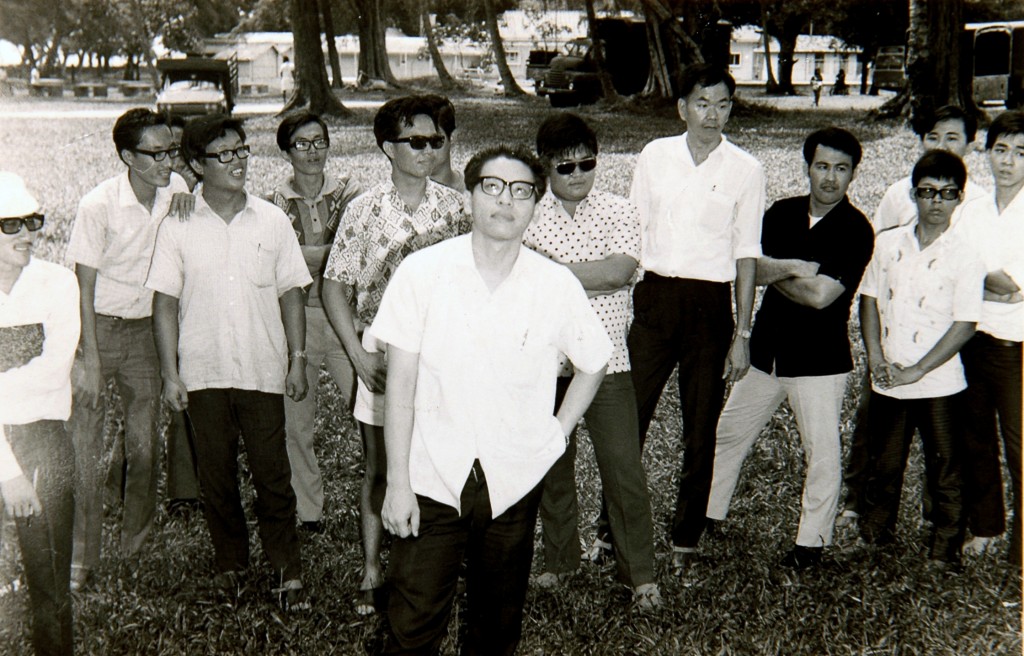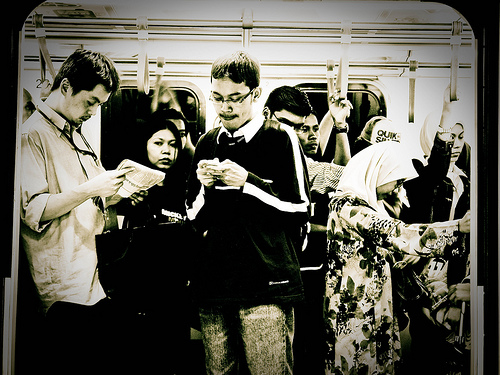 The youth being the future of Malaysia is not just a figure of speech. With more than 70 percent of Malaysians under age 40 and below, their aspirations and voting choice will decide the future of the country. The Rocket’s T.K Tan asked DAP parliamentary leader and Ipoh Timur MP Lim Kit Siang his views on the youths’ apathy and what can stir their imagination for change.
The youth being the future of Malaysia is not just a figure of speech. With more than 70 percent of Malaysians under age 40 and below, their aspirations and voting choice will decide the future of the country. The Rocket’s T.K Tan asked DAP parliamentary leader and Ipoh Timur MP Lim Kit Siang his views on the youths’ apathy and what can stir their imagination for change.
Presented with the quip, “Are Malaysian politicians addressing the issues youths are interested in – jobs, fulfilment, social mobility?” Kit Siang goes into a deep thought before answering. Admittedly, it’s a big question.
“There are several minuses that have handicapped the youths’ desire to express themselves, the flawed educational policies by the government being one of them. Deserving students being denied entrance to universities and scholarships and the standards and reputation of the universities themselves are declining, hence leading to low job prospects.
“These are some factors that are contributing to the stagnating prospects for them in terms of jobs, life fulfilment and social mobility. The youth are looking for room for self expression; the government and society has to provide the room and space for their views and interest on public and nation affairs,” he said.
However the current government has clearly not done that. In fact there is the threat of the Universities and University Colleges Act (UUCA) dangling over the agitated youths who want to voice out against the injustice in the system.
“Decades of UUCA abuse have led to the students and by extension even those who have graduated to have aversion to public involvement in voicing out against the authorities’ wrongdoing and injustice. The fear of government reprisals and backlash, losing out on good job prospects has bred an atmosphere of timidity,” Kit Siang elaborated.
Political apathy
 According to an internal poll performed by BN last year, political apathy amongst youth is very high. How do we get them interested in nation’s affairs? “The removal of restrictive laws and regulations will go a long way towards fostering youth participation in nation’s affairs.”
According to an internal poll performed by BN last year, political apathy amongst youth is very high. How do we get them interested in nation’s affairs? “The removal of restrictive laws and regulations will go a long way towards fostering youth participation in nation’s affairs.”
As for the current PR state’s efforts in reaching out to the youths, “whatever that can attract the youths’ attention, there has to be a sustained and conscientious efforts to reach out to them,” he continued.
Programs that cater to their needs will need to be implemented to attract their participation. It is a gargantuan task but he notes that political apathy is also prevalent in many countries around the world as well.
All is not lost though; he notes that the Bersih 2.0 demonstration stirred many youths’ interest briefly. Will more Bersih-type rallies do the trick? Only time can tell.
Does the message of change resonate with them? “If the youth realises the downward spiral of this nation is attributed to the high-handed and repressive policies and hegemony of UMNO’ rule, then perhaps the message of change will take root with them and they themselves will begin to take up the baton and propagate it,” he said.
As to whether the spate of student protests shown in the Adam Adli, Safwan, and Bukhairy incidents are a breath of fresh air in Malaysian student activism, he nods. “We may be witnessing a new beginning and awareness of student activism and perhaps even a foreshadow of a Malaysian Spring in the making.”
Cyber war
 How much impact would the cyber war have on voters’ psyche, even for rural youths? For all the hype about the coming general elections (GE) being touted as one that will be won and lost in the cybersphere, the veteran DAP leader thinks there is a caveat to the oft-repeated coffee talk that the cyberspace is definitely in PR’s favour.
How much impact would the cyber war have on voters’ psyche, even for rural youths? For all the hype about the coming general elections (GE) being touted as one that will be won and lost in the cybersphere, the veteran DAP leader thinks there is a caveat to the oft-repeated coffee talk that the cyberspace is definitely in PR’s favour.
“It all depends on which segment of news users one is discussing about. Admittedly the number of those who are connected to the internet and not dependent on the mainstream newspapers are growing, it may be important.”
“However we have witnessed the news vine in the internet to be one of exaggerations, be it pro-BN or pro-PR news pieces. The key will be the internet news users’ ability to discern the validity of the news, not to be pulled by the nose on the lies and falsehoods generated,” he cautioned.
Kit Siang believes Malaysians are by and large wise enough to discern such lies. “The people will initially be duped by such news hyperbole and buzz. The society has to go through the whole spectrum of wholesale acceptance, disillusionment, scepticism and finally discernment of the news vine generated. It will be the hallmark of a nation that has matured in its political process.”
As to the public and by extension the youths’ interest in wanting to know more about the truth, Lim believes society has to inculcate the whistle-blowing culture whereby more whistleblowers would have the courage to shed light on wrongdoings in public institutions for society’s good.
“This can only take place when legal protection for whistle-blowers is strengthened and enforcement agencies such as the MACC and police force really get to the bottom of scandals and not play cover-up for the powers-that-be.”
Stirring their imagination
How can PR stir their imagination? Youths all over the world have treaded the same path: the change has to come from them. “The challenge for PR in attracting the youths’ support is to convince them to claim the ownership and stake in making a change in the nation for a better future. DAP in particular needs to be seen as being able to articulate their views and concerns,” he explains.
Statistics shows that more than 70 percent of Malaysians are below 40 and have no memories and baggage of the May 13 stigma. As a first-hand observer and victim of BN’s bogeymen tactics in smearing DAP as the instigator of the racial riots, Lim wants Malaysian youths to break out of this debilitating psyche.
“For many decades, the spectre of the May 13 racial riots has been used and abused by the BN government to stunt the growth of democracy and unity as a nation in Malaysia. It is time for the youths to break free and demand change for a better tomorrow and fulfil Malaysia’s destiny to be a country that can stand tall and proud,” says Kit Siang.
Starting Young
 A towering political giant, Kit Siang’s list of achievements will leave many marvelling at his tenacity and attitude in striving for success. After finishing his O-levels examination in Batu Pahat High School in Johor, he worked as a teacher and journalist.
A towering political giant, Kit Siang’s list of achievements will leave many marvelling at his tenacity and attitude in striving for success. After finishing his O-levels examination in Batu Pahat High School in Johor, he worked as a teacher and journalist.
He became the secretary general of the Singapore (then part of Malaysia) chapter of National Union of Journalists at age 22. His interest in politics saw him becoming the political secretary to Devan Nair (the first DAP secretary general) and also taking the role of DAP national organising secretary at the tender age of 25.
Apart from being Nair’s political secretary and being involved in setting up DAP branches throughout the country, he was also the first Rocket editor in 1966. By then he was already a husband and father of four young children.
No mention of this man’s extraordinary career would be complete without the May 1969 elections result and its aftermath, which launched his political career. After winning the Bandar Melaka parliamentary seat he was subsequently detained under the Internal Security Act (ISA) for 15 months, he was released only in October 1970.
In the midst of his ISA detention, the DAP central leadership appointed him as the party’s secretary general. Kit Siang was to be elected to the position continuously till 1999. By 1973, he was appointed the country’s opposition leader, a post he was to hold intermittently from 1973 to 1999.
At an age where many 30-somethings today have yet to chart their life course, at thirty Kit Siang became the face of Malaysian opposition politics, fighting valiantly against BN’s hegemony and exposing many public wrongdoings. It cemented his position as a pre-eminent politician and statesman of Malaysia.
Role Model
This reporter’s awe and curiosity led to the inevitable query that would be on the minds of many young people:
How did you manage it all, with a family of five and the largest opposition party in the country to take care of?
If one has a heart and soul for it, he will make it. There was obviously a lot of sacrifice to be made in terms of being physically away from the family. But I made it a point to call my wife and children everyday. Despite my physical absences, they managed to feel that I was around for them in moral support.
With so many setbacks for DAP and you through the years, was there ever any thoughts of quitting?
Of course on certain days it was a struggle to continue. When I was in detention there were thoughts of depression and giving in. But I felt that as a Malaysian, every one of us can and should fight for justice, change and improvement for the country.
Any pearls of wisdom to share with aspiring politicians?
They have to have the stamina and perseverance to last the journey; as well as commitment and sincerity in serving the people. It is a long journey.
Green Field For The Taking
 A constant gripe on the lips of those with certain vintage is that the youths lack interest in national and current affairs. A survey conducted on youths in Malaysia by Merdeka Centre and the Asian Foundation at the end of 2008 shows otherwise.
A constant gripe on the lips of those with certain vintage is that the youths lack interest in national and current affairs. A survey conducted on youths in Malaysia by Merdeka Centre and the Asian Foundation at the end of 2008 shows otherwise.
53 percent of the youths surveyed read newspaper for news. When asked if they trusted or distrusted the mainstream media (MSM) reporting on the political and current issues, only 5 percent show lack of knowledge or no response to the question (National Youth Survey (NYS) 2008). This is a clear indication that youths are informed about the general affairs of the country.
However it is true that political apathy amongst the young is commonplace. More than 70 percent of 4.2 million unregistered voters at the end of 2010 are between 21 and 40 years old.
The same survey shows that only 64 percent of youths believed that their votes make a difference in influencing the government, a drop of 16 percent from the same poll a year before. There is a discernible sense of disillusionment amongst these youths with the country’s system of governance.
Political apathy may have also translated into political indecision among them. Even in an upbeat internal poll survey by the BN Youth Lab conducted in 2010, while 24 percent professed support for BN and 11 percent for Pakatan, an overwhelming 65 percent were undecided on their political preferences (China Press 28 August 2011). Since 2008, many youth opinion polls conducted shows similar results.
The fact is many youths are no longer susceptible to MSM propaganda or biased news coverage. 49 percent of those surveyed in the NYS survey distrusted the MSM reporting of political and current issues. Many youths today get their news feed from the internet and alternative sources.
Competition is fierce
The big number of undecided youths shows they are getting impatient with both BN and PR. This contest for the young voters is crucial, and the Najib administration knows it. BN head honchos have been busy initiating many youth-oriented programs and initiatives.
The BN Youth Fair and Million Youth Gathering were attempts to address the primary concerns of youth – the quest for a job and life fulfilment. Najib’s Twitter and Facebook pages are some of the most highly visited social media pages in Malaysia.
These initiatives are showing results: according to a poll by Che Hamdan Mohamed Razali, a lecturer of UiTM (Universiti Teknologi Mara) Terengganu, 70 percent of the poll respondents felt comfortable with the government (Bernama 25 December 2011).
The fight for young voters will either propel PR’s ascendancy to Putrajaya or show it to be a one-term wonder in the next coming GE. How will it play out? Well, the writing is already on the wall.
Youth of Malaysia
- 71.5 % of Malaysians are below 40 years old (2010 Census)
- More than 70 % of 4.2 million unregistered voters are below 40 years old
- 70 % have internet access (NYS 2008 survey)
- 65 % have no political preference (BN Youth Lab Survey, July 2010)
- 77 % want a multi-racial party to represent them (NYS 2008 Survey)



